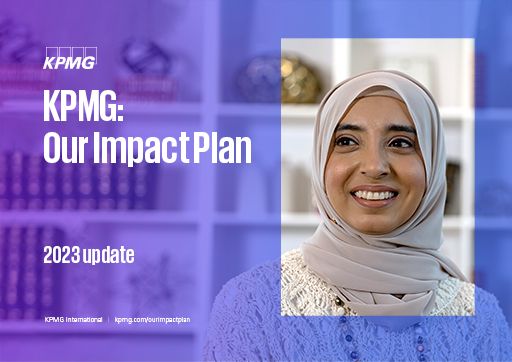For more than 150 years, we’ve inspired confidence while empowering change. Our purpose is rooted in rich history, built on our role to protect the public interest while shaping a better future for our people, clients and broader stakeholders. The pressures on business and society are rapidly increasing. With new challenges facing the world, our purpose is more relevant than ever.
At KPMG, we know that trust is earned by doing the right thing. To inspire confidence and empower change, we need to consider the economic, environmental and social impact of our activities, align our financial and societal performance as part of a shift toward stakeholder capitalism, and have strong governance in place to oversee all of our activities.

“We must be ready to see and respond to the business opportunities — not just the risks — presented by transforming businesses and communities to address ESG challenges. Without a healthy world, there is no sustainable business.“
We commit to always acting with a clear purpose, reflecting the meaningful work we do for our clients and our positive impact on society as a whole to sustainably grow our business. That’s how we believe we’ll achieve our ambition: to be the most trusted and trustworthy professional services organization.
We will continue to strive toward ESG as the watermark that runs through KPMG — empowering our people to become agents of purposeful change, leveraging our global talent to help clients and seeking to apply industry best practices throughout the global organization.
Our Purpose
By inspiring confidence in our people, clients and society, we help empower the change needed to solve the toughest challenges and lead the way forward.
People
We are a people business.
Our people crave opportunities to do meaningful and impactful work while developing a thriving career in an inclusive, diverse and caring culture.
Clients
We stimulate trust and confidence in business.
Our clients seek our expertise to overcome vast challenges ahead and to grow sustainably.
Society
We have a responsibility to build a sustainable future.
Society expects a fairer, more equitable future that doesn’t come with such deep costs to people and our planet.
Our structure and governance
KPMG has strong governance for overseeing our activities, setting policies and aligning our strategy with our purpose. KPMG International Limited acts as the co-ordinating entity for the overall benefit of the KPMG global organization. Its governance bodies are composed of the Global Council, the Global Board, the Global Management Team (GMT) and Global Steering Groups.
- Global Board: The Global Board is the principal governance and oversight body, currently consisting of 22 members from diverse jurisdictions that reflect KPMG’s global presence. Find out more about our Global Governance in our Global Transparency Report 2022.
- Global Management Team: The Global Board has delegated certain responsibilities to the GMT. These responsibilities include developing the global strategy by working together with the Executive Committee of the Global Board, jointly recommending the global strategy to the Global Board for its approval and overseeing the activities of the Global Steering Groups. The GMT also supports KPMG firms in their execution of the global strategy and KPMG International decisions and policies, including holding them accountable to their commitments. The list of GMT members is available on the leadership section of our website.
Our Values guide our day-to-day behaviors, informing how we act, the decisions we make and how we work with each other. They’re embedded in the entire employee journey, in our business processes and in all of our stakeholder interactions.
By living our Values and considering the impact of our work from a broad range of perspectives, we aim to be a purposeful business, fostering prosperity and helping address key issues faced by our clients and their stakeholders.
In 2022, KPMG in the UK conducted the first Values Week — designed to build better awareness and understanding of our Values, and to encourage our people to take greater ownership and accountability for living them. Each day focused on a different Value with a diverse line-up of guest speakers. The result was that the majority of the almost 12,000 participants reported that they believed that KPMG is committed to building a culture guided by our Values.
Our Values are:
- Integrity: We do what is right.
- Excellence: We never stop learning and improving.
- Courage: We think and act boldly.
- Together: We respect each other and draw strength from our differences.
- For Better: We do what matters.
People of KPMG

The importance of maintaining client confidentiality is emphasized through a variety of mechanisms, including our Global Code of Conduct. We have policies that address information security, confidentiality, and data privacy. Member firms also provide their personnel with annual training on confidentiality, information protection and data privacy requirements.
Speaking up safely
KPMG has a detailed approach for monitoring and reporting any illegal or unethical acts. Our Global Code of Conduct and policies and procedures set out a clear process for anyone seeking advice or wanting to report illegal or unethical behavior, and we openly encourage a culture of speaking up without any fear of reprisal. We prohibit retaliatory behavior when our people report ethical issues, breaches or suspected breaches in good faith.
KPMG firms are required to establish, communicate and maintain clearly defined channels to allow KPMG people and third parties to make inquiries about, raise concerns in relation to, provide feedback on, and notify of reportable matters without fear of reprisal, in accordance with applicable laws and regulations.
Supporting our speak-up culture, KPMG International has a hotline which is a mechanism for our people, KPMG firms’ clients and other third parties to confidentially report concerns they have relating to any activity by KPMG International, KPMG firms or KPMG people. This is in addition to other mechanisms that may exist within KPMG firms.
Driving purposeful transformations
Technology continues to evolve, shape and transform how businesses function and people interact. We’re working with organizations to shape this change and transform purposefully, helping them to create lasting value and responsible growth through new technology and business models.
Our Advisory professionals work with leading organizations to help create and protect the sustainable value of their business. For instance, we’re looking at the opportunities to help clients navigate corporate sustainability reporting requirements and climate-related disclosures.
We’re committed to ensuring that ESG is the watermark that runs through our business, providing enhanced approaches and services for clients.
- Our newly launched Climate Change and Decarbonization Center plays a critical role in coordinating our efforts with professionals across KPMG firms on a range of topics, including energy transition, built environment, climate policy, climate risk, carbon markets and more.
- We’re leveraging technology and helping clients assess their climate risks under a range of scenarios with KPMG Climate IQ, a multi-industry risk management tool that enables companies to identify, quantify and manage their physical and transition risks due to climate change. The tool was launched at the end of FY21 and scaled and evolved through FY22.
We continue to embed ESG in our tools and services and into our work with clients and will continue this journey in FY23 across three pillars of opportunity: transformation, reporting and assurance.
We’re committed to the highest standards of personal and professional behavior in everything we do.
The KPMG Global Code of Conduct (the Code) outlines our ethical principles and expectations as to how all KPMG people treat each other, our clients and the public. It demonstrates how our Purpose and Values inspire and guide all of our behaviors and actions. It defines what it means to work at and be part of KPMG, as well as our individual and collective responsibilities. We regularly review our Code to make sure it’s a clear reflection of these principles and expectations. In addition, all of our people are required to confirm their understanding of, and compliance with, the Code upon joining KPMG and thereafter on an annual basis.
Consistent with being signatories to the UN Global Compact, we work against corruption in all of its forms, including extortion and bribery. The Code clearly states that we don’t tolerate illegal or unethical behavior within KPMG or from clients, suppliers or public officials with whom we work. Bribery and corruption are unethical, even in situations where it might not be considered illegal in a particular jurisdiction.
All KPMG firms are required to have processes to assess prospective clients, third parties and suppliers in relation to bribery and corruption. Firms must also assess their bribery and corruption environment annually and establish and maintain processes to monitor, manage and control how their personnel and their agents interact with government entities and government officials so as to ensure compliance with applicable laws and regulations and to maintain public trust. Find out more about our position on bribery and corruption.
We take seriously any incidents that are inconsistent with our Values or in breach of the Code. As an industry we must have the highest standards of integrity. In FY22, news emerged of employees in a small number of KPMG firms sharing answers in training. KPMG takes incidents like this extremely seriously and our member firms hold our people accountable for any behavior of this kind. Our member firms learn from these incidents and have taken steps to strengthen their controls, policies and ethical culture, including leveraging technology. We have also enhanced our mandatory ethics and integrity training which all KPMG people complete annually. KPMG is committed to taking all necessary actions aimed at preventing incidents like this in the future.
Additionally, KPMG firms and professional accountants are bound by the International Code of Ethics for Professional Accountants, including International Independence Standards issued by the International Ethics Standards Board for Accountants (IESBA). These standards are in alignment with KPMG’s ethical principles and expectations.
Integrity training completion: KPMG firms provide regular mandatory training to partners and employees on a range of topics, including the Code and our anti-corruption policies and procedures.
KPMG International is committed to respecting human rights, as outlined in our Business and Human Rights Statement, which is in line with the UN’s Guiding Principles on Business and Human Rights and builds on our longstanding support for the UN Global Compact. This means supporting the protection of human rights, avoiding being complicit in human rights abuses (including those involving business relationships) and helping to eliminate all forms of forced, compulsory and child labor.
While the professional services industry is not typically considered a high-risk sector for labor-related breaches, we recognize we have an important role to play in managing potential harm to people through a risk-based approach to human rights due diligence.
Ethical behavior is of utmost importance to us, as reflected in our Business and Human Rights Statement. Additionally, our Global Code of Conduct articulates our zero tolerance for behavior that is illegal, unethical or breaches human rights — within both our global organization and our suppliers.
Addressing modern slavery risks
Case study
Our Impact Plan represents the collective environmental, social and governance commitments of independent KPMG firms, affiliated with KPMG International Limited. The data represented in Our Impact Plan is aggregated data from KPMG firms for the 12 months to 30 September 2021 unless stated otherwise. KPMG International Limited is a private English company limited by guarantee and does not provide services to clients. Where the terms “KPMG,” “firm,” “we” or similar references are used without definition, they are intended to refer to KPMG International Limited and the independent KPMG firms.
The financial information set forth represents combined information of the independent KPMG member firms that perform professional services for clients, affiliated with KPMG International Limited. The information is combined here solely for presentation purposes. KPMG International Limited performs no services for clients nor, concomitantly, generates any client revenue.
Throughout this webpage, “we”, “KPMG”, “us” and “our” refers to the global organization or to one or more of the member firms of KPMG International Limited (“KPMG International”), each of which is a separate legal entity.





